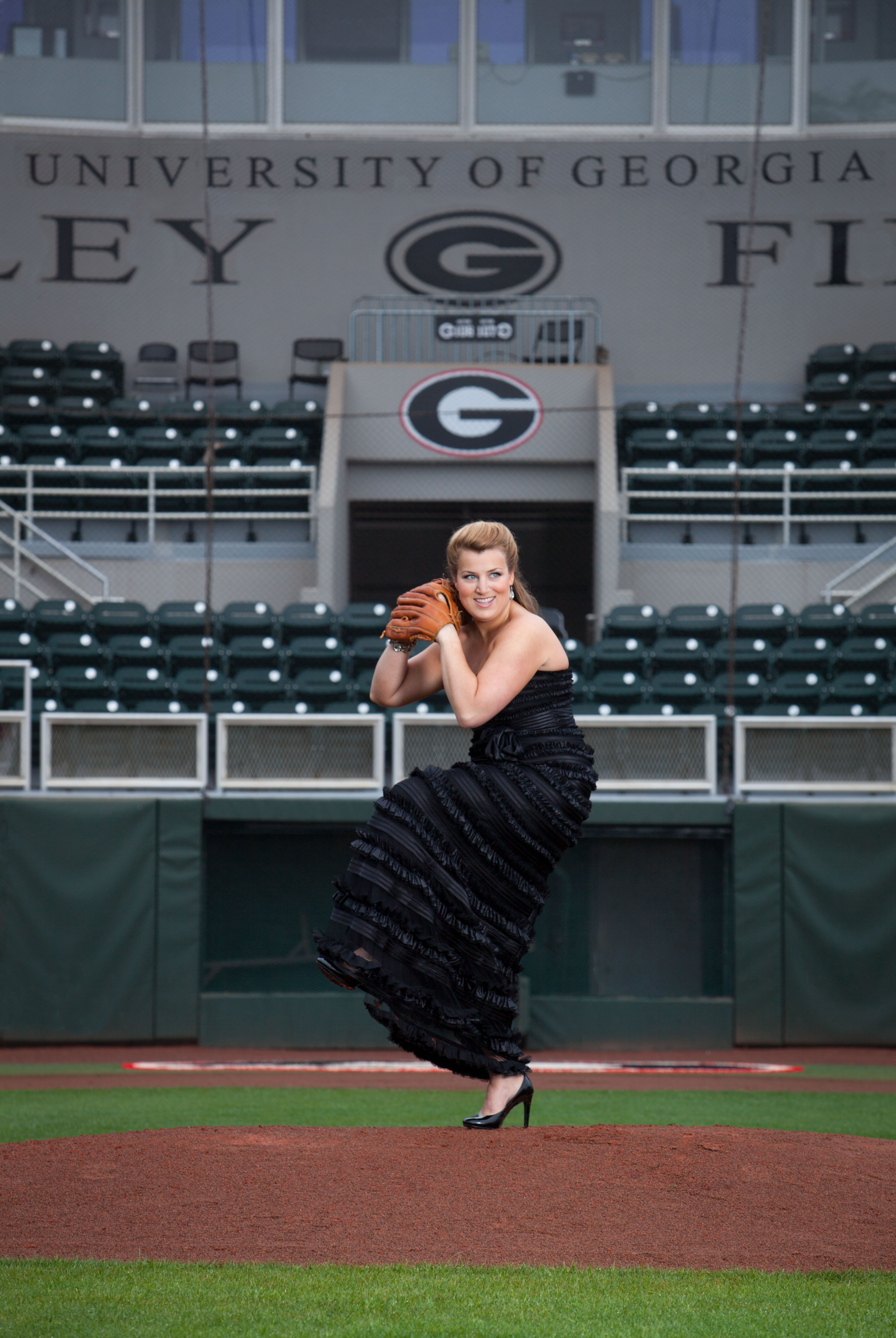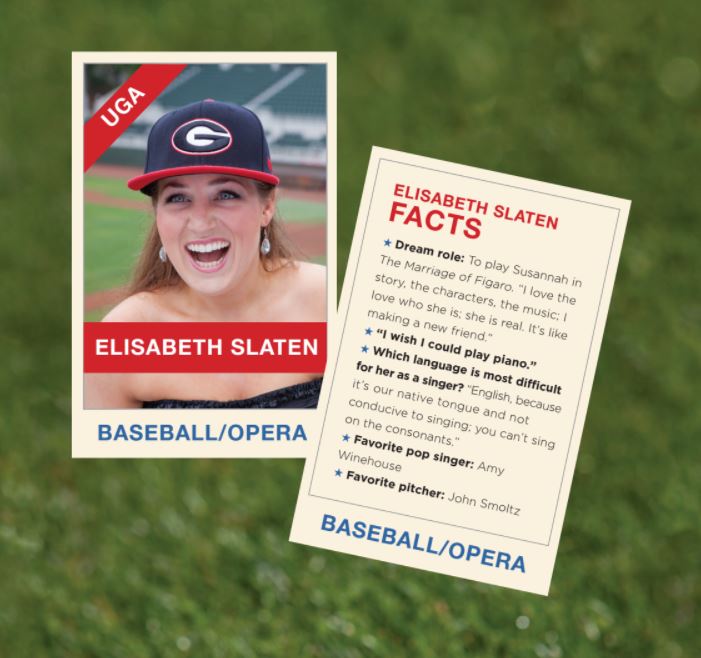Elisabeth Slaten: Is Opera like Baseball? YES!

By: Cynthia Adams | Photos by: Nancy Evelyn
Her father was a coach and her mother studied voice. Elisabeth Slaten could have wound up doing either one. Today she is a UGA doctoral candidate with a mean fastball and a voice that packs a wallop.
“I’m no diva,” Slaten says, adjusting thick blonde hair, which is casually twisted into a stylish chignon. In casual clothes, she blends into the blur of UGA students hurrying across campus. Youthful, full of energy, she has everything in common with the fellow students she often moonlights with after classes—more often than not, they are graduate students just like her.
But when Slaten takes the stage, Slaten takes the stage—every inch a rising opera star. It is difficult to imagine her as only 26; young to have already graduated from Mercer and the Peabody Conservatory in Baltimore. (UGA Opera Theatre Director Frederick Burchinal heard her sing at the Georgia State Council auditions for the Metropolitan Opera and urged Slaten to enter UGA’s doctoral program. She agreed.)
“It was an incredible blessing: Frederick Burchinal has a 40-year Verdi career. He’s a big deal, and we have him here at UGA,” Slaten says. “I get to sing two big roles per year, and in three years I’ll have a doctorate and a performance resume. I’m getting a great education at UGA.”
Slaten is an opera singer who just happens to have the classic good looks of a star like Renee Fleming. But, she would like to slay some myths about her chosen profession, including the whole matter of attitude. She’s never nervous on stage, Slaten insists, but she lacks hauteur unless it is required for the role she sings.
She sings everywhere—in Italian, French, German, Russian, and Spanish. But she does not sing in the shower. Apart from that, “I’m insanely normal,” she asserts. “I think opera is for normal people.” And then Slaten tells her coming-of-age story and darned well proves it.
She is a young woman who absolutely, positively loves sports. Luckily, both sports and musical performance require athleticism and a sprinkle of star power.

Elisabeth Slaten, PhD candidate in Opera on baseball field (Foley Field)
Slaten sings coveted operatic roles, and loves the idea of wowing crowds. “Getting on a stage is fun. I do not have to talk myself up, or have to get psyched up; I feel like this is my God-given ability so I’m confident.” Yet on a weekday morning, she is fresh-faced and looks the typical college coed.
There is another aspect of Slaten— the emerging star taking center stage in flamboyant costume and full-blown stage makeup—and then there is a young woman who is a devoted friend who enjoys playfulness and entertaining people. Turns out, she makes other noises as well, to the delight of co-workers.
Although she doesn’t sing at work, Slaten is a constant whistler, as coworkers and hotel guests attest whenever she works nights at the Hilton Garden Inn in downtown Athens.
“I whistle all the time,” she grins. “For the simple reason that there’s got to be a song going. One of the first things I ever learned from my grandmother was to whistle.” Slaten runs the famous Lauren Bacall lines, “’If you want me, just whistle. You know how to whistle, don’t you, Steve? Just put your lips together and…blow.’”
More laughter ensues. Slaten is cracking herself up. She playfully lets it be known she is a tomboy, one of the guys. It happens that way, Slaten explains, when you are the firstborn in a sports-loving family.
And she can pull a mug of beer as easily as she can pitch a fastball or belt out an aria.
She’s all that. Slaten is happy in stilettos, spikes, sneakers or cleats.
Her future could have looked quite different—in fact, Slaten muses that she could have quite happily become an athlete, hollering, “Batter up!” And maybe even pursued coaching. Without question, she is her father’s girl.
“I walk like my father. When I was a child, they were trying to teach me to walk like a lady,” she says, chortling. “I was going to be an athlete.” Slaten lettered in track and field in high school, to her father’s complete delight.
“I threw discus and shot put. I played soccer, swam, and played baseball. It’s not all that unusual in the area of Atlanta where I’m from—well, that’s just what you do with your kids.”
Her mother’s love of music and the appeal of performance tugged at her and won out during her high school years. Slaten became involved with community theater and studied voice while still a teenager.
She met Dian Lawler-Johnson, a teacher who became a mentor. “My high school voice teacher taught at Shorter College in Rome, Georgia, but I studied with her in her private studio in Alpharetta. Dian saw something in me and made me feel confident. There was even a whole year where my parents were struggling financially and she gave me lessons for free. We are still close.”
Encouraged by her mentor, Slaten entered voice competitions and attended auditions. At Mercer, she sang a character role in an early Baroque opera, playing Amore, or Cupid. In her junior year Slaten performed in Fiddler on the Roof. While still an undergraduate, Slaten sang at her favorite venue, the Grand Opera House in Macon.
By her senior year, she played Adina in Elixir of Love, which was also staged at UGA this past winter. The die was cast. Slaten won voice competitions and kept training.
She once asked her father how he prepared for a game. Slaten’s father talked about the art of the game.
“Dad told me how he prepared for games, and his process.” He told her about the power of positive thinking.
“It was helpful. I do believe in positive thinking. I know I will do well. I’ve put tons into my work!”
There’s one critical difference between baseball and opera, Slaten says:
“Baseball players have to bat 400; we have to hit 1,000 percent every time. You miss more than 10 percent of the notes you are singing, and you will never get hired!”
Even so, the ways that baseball is like opera helped Slaten discuss opera with her college friends. Many students have never heard an opera sung.
“It’s funny. The way I now talk about the fine arts is to use the analogy of baseball. Baseball players and singers are much more alike than you think,” she adds. “Baseball players have a good raw talent. Maybe they have a strong arm, and just need to know how to throw a ball or change the pitch. And if you have a good coach, you have a good career. And you have to stay focused mentally.”
Point made. One of Slaten’s favorite pitchers, John Smoltz, successfully pitched many years for the Atlanta Braves.
It’s much the same with singing. “You may have raw talent, but won’t be able to use your voice in the most efficient way. More so than baseball players, you have to train, years and years. It’s about minute, muscular changes. And getting into the business is like getting into the major leagues.”









